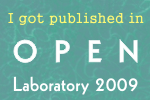“Let another man praise thee, and not thine own mouth; a stranger, and not thine own lips.” — Proverbs 27:2 “What-ever” — Me In PLoS Computational Biology this week, a trio of researchers provides a review of the challenges that metagenomics might ― and already do ― pose for bioinformaticians. The authors refer to metagenomic […]
Yes! Why should the evolution people have all the fun with their blog carnival? (After all, it is only a theory.) It’s time for bioinformaticians to show what we are made of, and to have a carnival of our own. Bio::blogs had a good run some time ago. I decided to reconnect what is hopefully […]
Byte Size Biology will be hosting the first edition of the bioinformatics blog carnival. All you bioinformatics bloggers, submit your entries by Mar 9, 2010 23:59:03 EST. Note the 3 second extension I have already given. There will be no more deadline extensions, I’ve been generous enough as it is. The carnival will be posted […]
In celebration of the biohackathon happening now in Tokyo, I am putting up a script that is oddly missing from many bioinformatic packages: extracting intergenic regions. This one was written together with my student, Ian. As for the biohackathon itself, I’m not there, but I am following the tweets and Brad Chapman’s excellent posts: Day […]
The source file associated with this post can be downloaded here. The last time I talked about how to read a GOA gene_associations file into a Python dictionary data structure. Our goal was to find all genes that are annotated as hydrolases in the GOA gene_associations file. The tricky part is, most enzymes are not […]
GOA, the Gene Ontology Annotation, provide Gene Ontology annotation to proteins in UniProt. It also provides GO annotations to several genome projects: Chicken, Arabidopsis, Fly, Human, Mouse, Rat and Cow. Anyone working on any of those genomes, or on UniProt and is interested in annotation, would most likely need to query GOA once in a […]
In no particular order or context. No personal stuff and by no means a complete list: WordPress (like, duh). Wikipedia (default for looking up new stuff) Wikis in general (great lab management tool. Don’t need LIMS) Open Access Publishing and Creative Commons licensing. FLOSS licensing (90% of the software I use, and 100% of what […]
Glimmer is a program that predicts ORFs in bacterial and archeal genomes. The input is the assembled genome FASTA file, the output are several files of the predictions in different stages. The terminal output file is the .predict file. which looks something like this: >NODE_1_length_38001_cov_935.551880 orf00001 481 362 -2 1.45 orf00002 451 567 +1 0.59 […]
First, a short glossary. Homologous genes are descended from a common ancestral gene. There are two types of homology: Orthology is homology due to a speciation event. So if there is a gene A’ in humans and A” in mice, and they are obviously similar in sequence, we infer that they homologous. We usually also […]
I will try to maintain a weekly poll on BsB, for matters biologick, bioinformatick, generally scientifick or otherick. As in any poll, if read too much into its questions or answers, you should seriously chill. That being said, comments are most welcome. The poll is on the sidebar that’a’way.—> (Scroll a bit down if you […]
Proteins are the machinery of life, and they facilitate most of life’s functions. Traffic into and out of the cell? Protein pumps, pores and channels. Respiration? Proteins. Metabolism and catabolism? Proteins. Immune system, signaling, development… all complex networks of interacting proteins. Understanding a protein’s structure can tell us a lot about how it performs its […]
First, a non-bioinformatic one liner, which is very relevant to most of us working on 3 different machines simultaneously, not including the 80 in our cluster. ssh-ing and giving your password each time is painful, and makes it almost impossible to do scripted file transfers, like backups. A good solution is shared key ssh in […]
In any programming gig, and that includes bioinformatics, a lot of repeat scriptology comes cropping up. I decided to share some of that, pro publico bono, and also because I hope to start some sort of ongoing cookbook for short bioinformatics hacks. If you have any cool short scripts you like to share, please email […]





